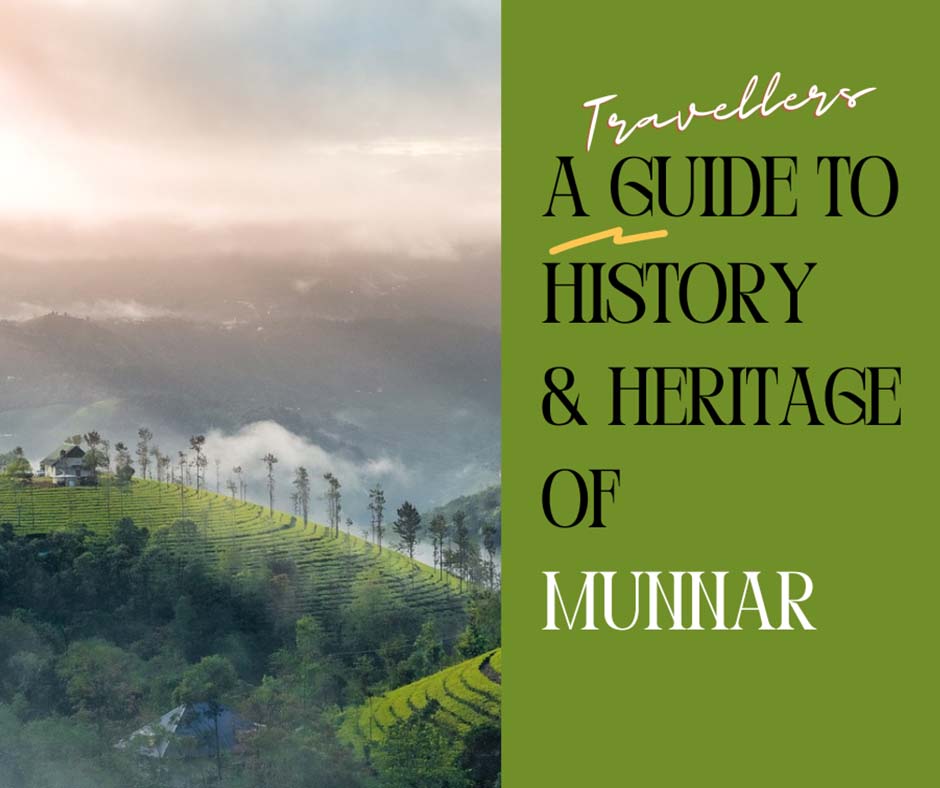
Munnar is a popular hill station and the centre of the tea plantation business in Kerala. Moreover, it is one of the best regions in Kerala to enjoy the western ghats.
Human presence in Munnar dates back to BCE. “Muniyaras” (Dolmens) in Marayoor near Munnar confirms that native human tribes inhabited this area as early as 4000 BCE. The indigenous tribes of Muthuvans and Adivasis occupied the region. Later, the area was annexed to the Kingdom of Travancore. In the 19th century, the British surveyed the area and converted it into a tea plantation region.
Tea plantations in Munnar began in the late 19th century when A.H. Sharp planted the first tea saplings in 1879. English and Scottish planters followed suit, and the tea industry proliferated in the region. By the early 20th century, Munnar had become one of the largest tea producers in the world.
Today, visitors can tour tea estates, learn about the tea-making process, and enjoy freshly brewed tea while enjoying scenic views.
Initially, Munnar was a summer retreat by British officials. But when they found the climatic conditions on this hill were ideal for planting tea, they brought tea over to the Munnar hills in the 19th century. They initiated many instructional developments, such as the construction of a good road network, a local railway line, a ropeway system, dams etc., to improve the viability of the tea plantation business here.
The colonial heritage of Munnar is evident in its plantation bungalows and a few English area churches still remaining in here. The Munnar club is also a functioning heritage of the colonial plantation era.
Munnar is connected by roads from Cochin and many central Kerala cities. Cochin International Airport is about 110 kilometres/68 miles away. From there, visitors can take a taxi or bus to reach Munnar. The nearest railway station is Aluva, approximately 114 kilometres away/69 miles away from Munnar.
a. Tata Tea Museum – offers a fascinating insight into the history and production of tea in Munnar.
b. Mattupetty Dam – built in the early 1940s, provides a panoramic view of the surrounding hills and valleys.
c. Christ Church – established in the early 1900s, features stunning stained glass windows and British-era architecture.
d. Pothamedu View Point – offers a breathtaking panoramic view of the tea estates and the surrounding hills. In addition, you can see many colonial-era plantation bungalows in the area.
e. Kundala Dam and Lake – built in the 1940s- offers a serene location for boating and picnicking.
Munnar has several other attractions worth visiting besides the historical and heritage places. The Eravikulam National Park is a protected area for the endangered Nilgiri Tahr and offers a unique wildlife experience. You can also trek to The Anamudi Peak, the highest peak in South India. The Chinnar Wildlife Sanctuary and the Top Station are other popular tourist attractions in Munnar.
October to April. During this time, the weather is pleasant, and the tea estates are in full bloom. You should avoid the monsoon season, which lasts from June to August, as the heavy rainfall can lead to landslides and road closures.
Munnar has endangered Nilgiri Tahr ( a species of mountain goat) kept in a protected zone. The town of Munnar is named after the confluence of three rivers – Mudhirapuzha, Nallathanni, and Kundaly. Munnar is also known for its Neelakurinji flowers, which bloom once every twelve years, turning the hills into a sea of blue.
Munnar is worth visiting for its plantation history and natural beauty. The region offers a unique blend of colonial-era architecture, tea plantations, wildlife, and traditional arts and crafts.
Munnar has many erstwhile plantation bungalows converted as resorts and homestays to choose from. We are listing blow two of the best for consideration.
An expedition is the application of known travel knowledge to explore unknown lands. Pally Planet is an online resource for adventure travelers that encourages you to explore more! This blog offers destination insights, itineraries, and travel tips for nature enthusiasts, wildlife photographers, birdwatchers, anglers, and trekkers. Let the expedition begin!
An expedition is the application of known travel knowledge to explore unknown lands. Pally Planet is an online resource for adventure travelers that encourages you to explore more! This blog offers destination insights, itineraries, and travel tips for nature enthusiasts, wildlife photographers, birdwatchers, anglers, and trekkers. Let the expedition begin!
Disclaimer: The photos and logos displayed on this website are the property of their respective brands of accommodations. Any reproduction or use without their permission is strictly prohibited.
7, GD Villas, Palarivattom, Kochi, IN 682028, +91 484-4059260, [email protected]
Copyright © 2022 | All Rights Reserved.